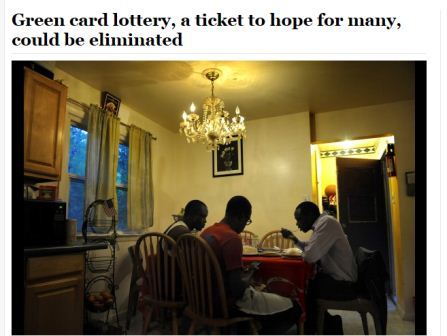Green Card Lottery on the Chopping Block

As it stands, the bill is set to hit the Senate floor in early to mid-June. A vote to uphold the current elements of the bill would eliminate the diversity program and replace it with a new, merit-based program. If implemented, visa issuance as it stands now would come to a halt beginning next year.
The merit system is based upon attributes such as education, work experience, English language, and familial relationship to a U.S. citizen.
The inception of the Diversity Immigrant Visa Program was intended to promote immigration from countries that generally had low rates. Since the early 1990s, much of that focus has been on African countries such as Ghana, Nigeria, and Ethiopia.
The program is the third most common means of immigration among African communities, awarding one in five Africans entry into the U.S. between the years of 2010 and 2012 alone. The other two primary forms are family reunification at 43% and refugee status/asylum seekers at 23%.
The relevance of the lottery system across African communities is undeniable. Upon receipt of the lottery, many families and individuals are given more opportunities for work, education, and improved livelihood, which in turn allows them to send money back home.
Historically, the visa program has been strongly supported by the Democratic party and more specifically within the Congressional Black Caucus, which recognizes its relevance in ensuring an African presence in the immigration community. Members across the African diaspora have raised concern about the threat of elimination of this program, stating that the number of African immigrants will decrease even with the merit-based system.
Opponents have become disenchanted with the intended purpose of the program, arguing that there is an extreme vulnerability within its components that allow for deceitful practices, including internet scams, false websites, and advertisements that misinform and trick applicants into sending money to fabricated people and establishments. In addition, some are concerned about homeland security and how the maintenance of this program could lead to an increase in the number of terrorists.
Scamming can be a challenge; however, it is important to take into consideration the difficulty associated with obtaining a visa through the lottery system. The rigorous analysis completed by the State Department leaves roughly half of all finalists disqualified. Just within this year, of the 7.9 million applicants, only 55,000 final visas will be issued. To make the process more difficult, another caveat drops countries off of the eligibility list if the previous five years had immigration rates surpassing 50,000.
In order for this legislation to pass, the Senate would need at least 60 votes. However, even with bi-partisan support, there is vast uncertainty as to how this will fit into the House version of immigration reform.

